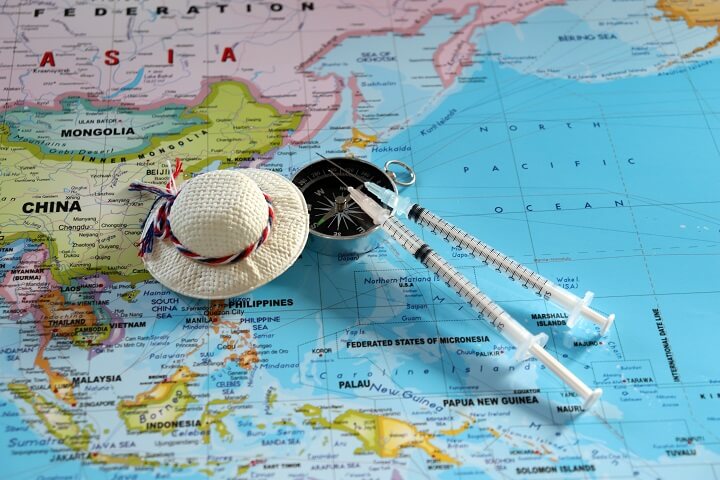If you’re planning to travel to Dubai or the Middle East, you might have questions about vaccinations. One of the most common questions is about the yellow fever shot in Dubai. The short answer is that you don’t always need the vaccine, but it is a vital part of planning a safe trip. Understanding the rules for the yellow fever vaccination and other travel shots is a key part of preparing for your journey.
Why Are Travel Vaccinations Important? The Role of the Yellow Fever Shot Dubai
Why are travel vaccinations important? They are a simple and effective way to protect yourself from unfamiliar diseases. In unfamiliar environments, you might encounter pathogens that you don’t have immunity to. Vaccines act as a shield, preventing contagious diseases and allowing you to travel with peace of mind. Knowing the right immunizations for travel to the Middle East is a simple way to stay healthy and enjoy your trip.
Yellow Fever Vaccination: Do You Need It for Dubai?
The rules for the yellow fever vaccination are very specific and depend on where you are traveling from. You do not need a yellow fever shot in Dubai if you arrive from a country where yellow fever is not a risk.
However, if you travel to Dubai from a country where yellow fever is present, officials will require the vaccination. This is a very important rule to follow, as immigration officials can deny you entry or place you in quarantine if you don’t have a valid vaccination certificate (also known as the “yellow card”). The same rule applies to Dubai residents who travel to a high-risk country and are returning. Without this certificate, officials could deny them entry or quarantine them.
Countries That Require the Yellow Fever Vaccination (when traveling to Dubai):
- Africa: This includes countries like Nigeria, Ghana, Kenya, Uganda, and Angola.
- South America: This includes countries like Brazil, Colombia, and Peru.
It is always a good idea to check the latest travel advisories for your specific destination before you go.
What are the Symptoms of Yellow Fever?
Yellow Fever is a serious disease, but many people who get it have mild or no symptoms. The illness typically happens in two stages: an initial, acute phase, followed by a more severe, toxic phase in a small percentage of cases.
- Initial Symptoms: Symptoms of Yellow Fever usually appear 3 to 6 days after an infected mosquito bites a person. These initial symptoms are often similar to the flu and may include a sudden onset of fever, chills, headache, back pain, muscle pain, nausea, vomiting, and a general feeling of fatigue.
- Toxic Phase: In about 15% of cases, after a brief period of feeling better, the illness progresses to a more severe “toxic phase.” During this phase, the symptoms are much more dangerous and can be life-threatening. They include a high fever, jaundice (yellowing of the skin and eyes), and bleeding from the mouth, nose, or eyes.
Important Note: This information is for educational purposes only. If you believe you have been exposed to Yellow Fever or are experiencing these symptoms, you must seek professional medical help immediately.
Recommended Travel Vaccinations for the United Arab Emirates
While not everyone needs a yellow fever shot, there are other recommended travel to Middle East vaccines. The CDC and WHO recommend that most travelers consider the following shots for the United Arab Emirates:
- Hepatitis A and B: These vaccines protect you against liver diseases. Contaminated food and water or bodily fluids can spread them.
- Typhoid: This vaccine protects against a bacterial infection that spreads through contaminated food and water.
- Polio: The CDC recommends a booster shot for adults because of an increase in global cases.
- Tetanus, Diphtheria, and Pertussis (Tdap): Experts often recommend a booster to ensure your protection.
- Rabies: This vaccine is for long-term travelers or those who may have contact with animals.
- Influenza and COVID-19: The CDC and WHO also recommend these vaccines for travel to all regions.
How to Get Your Vaccinations
Travel vaccination clinics in Dubai, like the CMC Hospital, offer expert consultations and a wide range of shots. It is best to schedule your visit at least 4-6 weeks before your trip. This gives you enough time to get multiple doses if you need them.
Conclusion
When planning your trip to Dubai, remember that a yellow fever shot in Dubai is only required if you come from a high-risk country. However, getting other recommended vaccines is an important part of your preparations. By taking these steps, you can ensure a safe and healthy trip, allowing you to fully enjoy your time in the Middle East.
To continue your journey into the richness of the Arabic language and its cultures, consider using the Kaleela app. It provides comprehensive lessons on Modern Standard Arabic and various dialects, helping you master not just the words but also the traditions behind them.



